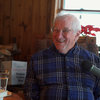E Stewart Jones still on the case for Spargo
By Zach Simeone
BERNE E. Stewart Jones, who has represented former Supreme Court Justice Thomas Spargo during the better part of his decade-long legal battle, is fighting a conflict-of-interest charge that could take him off the case.
At a March 5 hearing, Jones will fight a motion made last month by federal prosecutors Richard C. Pilger and M. Kendall Day that he be disqualified from representing Spargo, as he may take the witness stand.
“The argument is that there’s a potential conflict of interest, and that I should be required to become a witness in this,” Jones told The Enterprise this week, “but you’ve got to read between the lines. They want me off the case because they want me off the case.” Jones sees no conflict of interest, he said.
The conflict, prosecutors say, exists primarily because of a $10,000 donation that Jones made years back towards a fund that would cover Spargo’s legal expenses.
Spargo, a Berne resident, ran for and won a race for Berne town judge in 1999. His current case stems from charges that he was unethical in the Berne race, buying pizzas, doughnuts, and drinks for voters.
“My testimony is not necessary,” Jones said. “[Spargo] was not in any way involved in the request made to me for a contribution to his defense fund.” Further, Jones said, Spargo has the right to the counsel of his choice.
The Commission on Judicial Conduct tried to remove Jones from Spargo’s defense on similar grounds once before, Jones said. “They were unsuccessful then, and we will be opposing their efforts now,” he said.
In regards to his current plan for defense, Jones would not comment. Still, he feels that Spargo has been wrongfully accused, which is “devastating for anyone to live with,” Jones said.
Charges
On Dec. 10, Spargo was charged with one count of attempted extortion and one count of attempted bribery. He was arraigned on Dec. 16.
According to the indictment from the United States District Court for the Northern District of New York, a grand jury charged that Spargo, while a Supreme Court justice, solicited and pressured an Ulster County attorney practicing before him to consent to give $10,000 to benefit him “all under color of official right and induced by fear of economic harm,” the indictment says.
Further, on the count of attempted bribery, it says Spargo “corruptly solicited and demanded, for his own benefit…$10,000…for the use of his official actions and influence to the benefit of an Ulster County attorney practicing before him, and for refraining from the use of his official actions and influence to harm that Ulster County attorney.”
The roots of these issues reach back to 1999, when Spargo was running for town justice as a Republican in Berne. The New York State Commission on Judicial Conduct charged that, during this time, he handed out $5 gift certificates to voters and, after identifying himself as a candidate for town justice, brought a round of drinks at a bar.
In addition, the commission charged, he handed out coupons for doughnuts, coffee, and gasoline; gave out half-gallons of apple cider and doughnuts at the town dump; and purchased and delivered pizza for Berne-Knox-Westerlo teachers, town highway department workers, and workers at the school bus garage.
While judges are allowed to hand out promotional material, the commission said, they cannot distribute things of value to voters. Spargo, a Republican, won the election, in a town where Democrats outnumbered Republicans 3 to 1.
While serving as town justice, the commission charged, Spargo saw criminal cases prosecuted by the Albany County District Attorney’s Office, without disclosing to the defense that he had rendered legal services to Paul Clyne’s campaign for district attorney, or that the Clyne campaign committee owed Spargo $10,000 for legal services.
In both instances, the commission said, Spargo “failed to avoid impropriety and the appearance of impropriety and failed to act at all times in a manner that promotes public confidence in the integrity and impartiality of the judiciary.”
Then, in May of 2001, the commission said that Spargo, calling himself a candidate for the Supreme Court, talked at a fund-raiser in Rochester about his work in the Florida recount on behalf of the George W. Bush presidential campaign. The commission said that this “exceeded the boundaries of permissible conduct.”
The commission filed complaints against Spargo in 2002 for these charges. Spargo argued that his First Amendment rights were being violated, and eventually lost the case.
To pay for the legal costs associated with these charges, the commission said, Spargo approved the creation of the Thomas J. Spargo Legal Expense Trust. In 2003, the commission charged, Spargo asked, through friends, for contributions to this trust from lawyers with cases before him.
Bruce Blatchly, an attorney from New Paltz, told The Enterprise in 2004 that Spargo invited him to “meet some people” at a luncheon at La Canard in Kingston. Blatchly suspected that he would be asked for money at this lunch, as he had never dined with Spargo before, he said.
As he was leaving the luncheon, Blatchly said, he was approached by Sanford Rosenblum, an old friend of Spargo, who asked him for $10,000.
Eight days later, Blatchly told the commission, Spargo called him to discuss the judicial assignments for the coming year. That call, the commission said, “Was intended to induce Mr. Blatchly to contribute to respondent’s legal expense fund.”
“Yes,” Jones concluded this week, “it’s been suggested that I may be a witness, as there may be a conflict of interest there, but I don’t see the conflict, the materiality, or the necessity for my testimony. At the end of the day, the judge will make the call.”
